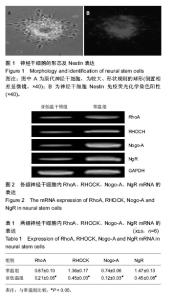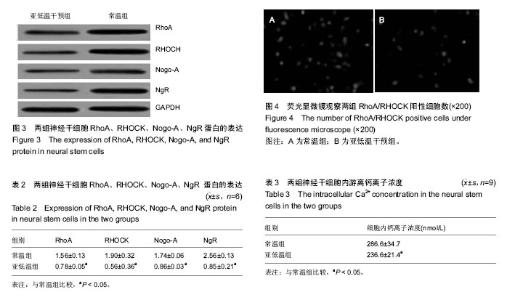Chinese Journal of Tissue Engineering Research ›› 2017, Vol. 21 ›› Issue (13): 2094-2099.doi: 10.3969/j.issn.2095-4344.2017.13.021
Previous Articles Next Articles
RhoA/ROCK pathway of neural stem cells under mild hypothermia
Li Chao1, Fu Hong-jie2, Zhang Jian-jun2, Wang Dong2
- 1The Fourth Clinical College of Tianjin Medical University, Tianjin 300041, China; 2Tianjin Fourth Central Hospital, Tianjin 300143, China
-
Revised:2017-03-13Online:2017-05-08Published:2017-06-09 -
Contact:Wang Dong, Master, Chief physician, Tianjin Fourth Central Hospital, Tianjin 300143, China -
About author:Li Chao, Master, Physician, The Fourth Clinical College of Tianjin Medical University, Tianjin 300041, China -
Supported by:the Postgraduate Fund of the Tianjin Fourth Central Hospital; the Scientific Foundation of the Health and Family Plan Committee of Tianjin, No. 2015KR20
CLC Number:
Cite this article
Li Chao, Fu Hong-jie, Zhang Jian-jun, Wang Dong. RhoA/ROCK pathway of neural stem cells under mild hypothermia[J]. Chinese Journal of Tissue Engineering Research, 2017, 21(13): 2094-2099.
share this article

2.1 神经干细胞形态及鉴定结果 培养1 d后神经干细胞增多、较小、形状不规则,小部分细胞团贴壁;培养5 d后神经干细胞增多,为较大、形状规则的球形,见图1A。免疫荧光染色显示,神经干细胞球呈Nestin强阳性表达,见图1B。 2.2 RhoA、RHOCK、Nogo-A、NgR mRNA的表达 亚低温干预4 h,亚低温组神经干细胞RhoA、RHOCK、Nogo-A、NgR mRNA的表达较常温组明显降低,差异有显著性意义(P < 0.05),见图2,表1。 2.3 RhoA、RHOCK、Nogo-A、NgR蛋白的表达 亚低温干预4 h,亚低温组神经干细胞RhoA、RHOCK、Nogo-A、NgR蛋白的表达较常温组明显降低,差异有显著性意义 (P < 0.05),见图3,表2。 2.4 荧光显微镜观察RhoA/RHOCK阳性细胞数 常温组RhoA/RHOCK阳性细胞数为(31.04±4.62)个/高倍视野,亚低温组为(11.25±1.27)个/高倍视野,差异有显著性意义(P < 0.05),见图4。 2.5 细胞内钙离子浓度测定 与常温组比较,亚低温组神经干细胞细胞内钙离子浓度低于常温组,差异有显著性意义(P < 0.05),见表3。"

| [1] Chung TN, Kim JH, Choi BY,et al. Effect of Adipose-Derived Mesenchymal Stem Cell Administration and Mild Hypothermia Induction on Delayed Neuronal Death After Transient Global Cerebral Ischemia.Crit Care Med. 2017;45(5):e508-e515. [2] Chen C, Ma TZ, Wang LN, et al. Mild hypothermia facilitates the long-term survival of newborn cells in the dentate gyrus after traumatic brain injury by diminishing a pro-apoptotic microenvironment. Neuroscience. 2016;335:114-121. [3] Rzechorzek NM, Connick P, Livesey MR,et al. Hypothermic Preconditioning Reverses Tau Ontogenesis in Human Cortical Neurons and is Mimicked by Protein Phosphatase 2A Inhibition. EBioMedicine. 2015;3:141-154.[4] Zhao ML, Chen YS, Li XH, et al. Effect of chemical microenvironment after traumatic brain injury on temperature- sensitive umbilical cord mesenchymal stem cells. Zhongguo Ying Yong Sheng Li Xue Za Zhi.2015;31(3):207-210, 215.[5] 冯金周,曾俊,江华,等.亚低温对重型颅脑损伤患者静息能量消耗影响的随机对照研究[J].中华神经外科杂志,2015,31(2): 192-195.[6] 曹健锋,晋鑫,史载祥,等.亚低温治疗创伤性脑损伤的研究进展[J].中华神经医学杂志,2015,14(4): 444-448.[7] 姚海燕,李青,梁道臣,等.甲泼尼龙联合亚低温治疗急性脊髓损伤[J].实用骨科杂志,2016,22(5):414-417.[8] 康文博,李晓红,陈翀,等.亚低温对脊髓损伤后反应性星形胶质细胞增生的影响[J].中国应用生理学杂志,2016,32(4):289-292, 385- 387.[9] Rzechorzek NM, Connick P, Patani R, et al. Hypothermic Preconditioning of Human Cortical Neurons Requires Proteostatic Priming. EBioMedicine. 2015;2(6):528-535. [10] Kwak M, Lim S, Kang E, et al. Effects of Neonatal Hypoxic-Ischemic Injury and Hypothermic Neuroprotection on Neural Progenitor Cells in the Mouse Hippocampus. Dev Neurosci. 2015;37(4-5):428-439.[11] Wang D, Liang J, Zhang J, et al. Mild hypothermia combined with a scaffold of NgR-silenced neural stem cells/Schwann cells to treat spinal cord injury. Neural Regen Res. 2014;9(24): 2189-2196. [12] Wang L, Jiang F, Li Q, et al. Mild hypothermia combined with neural stem cell transplantation for hypoxic-ischemic encephalopathy: neuroprotective effects of combined therapy. Neural Regen Res. 2014;9(19):1745-1752.[13] Belinsky GS, Antic SD. Mild hypothermia inhibits differentiation of human embryonic and induced pluripotent stem cells. Biotechniques. 2013;55(2):79-82. [14] Hemphill MA, Dauth S, Yu CJ, et al. Traumatic brain injury and the neuronal microenvironment: a potential role for neuropathological mechanotransduction. Neuron. 2015;85(6): 1177-1192.[15] 陈刚,万虹,杨飞,等.大鼠脊髓损伤后PLGA支架细胞髓内移植的组织学观察[J].中华神经外科杂志,2011,25(1):83-86.[16] 孙晶晶,宋乃光, 张耀龙,等.高压氧治疗促进脑梗死模型大鼠神经再生微环境及神经功能的恢复[J].中国组织工程研究,2015, 19(40): 6460-6464. [17] 李哲,郭钢花,王国胜,等.基质细胞衍生因子-1对神经干细胞移植治疗脊髓损伤大鼠疗效的影响[J].中华物理医学与康复杂志, 2015,37(6):411-415.[18] Wang Y, Wang H, Tao Y, et al. Necroptosis inhibitor necrostatin-1 promotes cell protection and physiological function in traumatic spinal cord injury. Neuroscience. 2014; 266:91-101.[19] 陈以胜,赵明亮,梁海乾,等.亚低温后脑损伤组织提取液对体外脐带间充质干细胞的影响[J].中华创伤杂志,2016,32(1): 80-84. [20] Lu C, Xia J, Bin W, et al. Advances in diagnosis, treatments, and molecular mechanistic studies of traumatic brain injury. Biosci Trends. 2015;9(3):138-148.[21] Jiang JL, Guo XD, Zhang SQ, et al. Repetitive magnetic stimulation affects the microenvironment of nerve regeneration and evoked potentials after spinal cord injury. Neural Regen Res. 2016;11(5):816-822.[22] 郭杨,马勇,董维,等.脊髓康对脊髓损伤大鼠血清脑源性神经营养因子及神经生长因子表达的影响[J].中国中医药信息杂志,2015, 22(11): 65-68.[23] Ide C, Kanekiyo K.Points regarding cell transplantation for the treatment of spinal cord injury.Neural Regen Res.2016;11(7): 1046-1049. [24] Xiong M, Li J, Ma SM, et al. Effects of hypothermia on oligodendrocyte precursor cell proliferation, differentiation and maturation following hypoxia ischemia in vivo and in vitro. Exp Neurol. 2013;247:720-729. [25] Xiong M, Chen LX, Ma SM, et al. Short-term effects of hypothermia on axonal injury, preoligodendrocyte accumulation and oligodendrocyte myelination after hypoxia-ischemia in the hippocampus of immature rat brain. Dev Neurosci.2013; 35(1):17-27. [26] Tu Y, Chen C, Sun HT, et al. Combination of temperature- sensitive stem cells and mild hypothermia: a new potential therapy for severe traumatic brain injury. J Neurotrauma. 2012;29(14):2393-2403.[27] Imada S, Yamamoto M, Tanaka K, et al. Hypothermia-induced increase of oligodendrocyte precursor cells: Possible involvement of plasmalemmal voltage-dependent anion channel 1. J Neurosci Res. 2010;88(16):3457-3466. [28] Ide C, Nakano N, Kanekiyo K.Cell transplantation for the treatment of spinal cord injury–bone marrow stromal cells and choroid plexus epithelial cells.Neural Regen Res.2016;11(9): 1385-1388.[29] 赵鹏.亚低温对大鼠急性脊髓损伤后局部线粒体呼吸功能的影响[A].中华医学会、中华医学会急诊医学分会.中华医学会急诊医学分会第17次全国急诊医学学术年会论文集[C].中华医学会、中华医学会急诊医学分会,2014.[30] 胡勇,黄巍,李德宝.亚低温对急性脊髓损伤后肿瘤坏死因子-α表达及运动功能恢复的影响[J].中国医药导报,2013,10(7):47-48, 51.[31] 赵鹏,余厚友,王肖,等.亚低温对大鼠急性脊髓损伤后局部线粒体呼吸功能的影响[J].陕西医学杂志,2010,39(3):288-290.[32] Lin CH, Wu WS, Lin MT, et al. Attenuating ischemia-induced H9c2 myoblasts apoptosis by therapeutic hypothermia. Am J Med Sci. 2010;339(3):258-265.[33] Wang D, Yang Z, Zhang J. Treatment of spinal cord injury by mild hypothermia combined with bone marrow mesenchymal stem cells transplantation in rats.Zhongguo Xiu Fu Chong Jian Wai Ke Za Zhi. 2010;24(7):801-805.[34] Fukuda A, Fukuda H, Jönsson M, et al. Progenitor cell injury after irradiation to the developing brain can be modulated by mild hypothermia or hyperthermia. J Neurochem. 2005;94(6): 1604-1619. [35] Blatt A, Cotter G, Leitman M, et al. Intracoronary administration of autologous bone marrow mononuclear cells after induction of short ischemia is safe and may improve hibernation and ischemia in patients with ischemic cardiomyopathy. Am Heart J. 2005;150(5):986. [36] Wang D, Zhang J. Electrophysiological functional recovery in a rat model of spinal cord hemisection injury following bone marrow-derived mesenchymal stem cell transplantation under hypothermia. Neural Regen Res. 2012;7(10):749-755. [37] Zhu P, Zhao MY, Li XH, et al. Effect of low temperatures on BAX and BCL2 proteins in rats with spinal cord ischemia reperfusion injury. Genet Mol Res. 2015;14(3):10490-10499.[38] Wu XB,Xu XM,et al.RhoA/Rho kinase in spinal cord injury. Neural Regen Res.2016;11(1): 23-27.[39] Boadas-Vaello P, Verdú E.Epigallocatechin-3-gallate treatment to promote neuroprotection and functional recovery after nervous system injury. Neural Regen Res. 2015;10(9): 1390-1392.[40] Kaul R, Chhabra HS, Kanagaraju V, et al. Antepartum surgical management of Pott's paraplegia along with maintenance of pregnancy during second trimester. Eur Spine J. 2016;25(4): 1064-1069. [41] 张建军,史焕昌,杨卫山,等.亚低温条件下脊髓损伤模型大鼠神经再生微环境及运动功能的变化[J].中国组织工程研究,2015, 19(27):4316-4321.[42] Handrakis JP, Liu SA, Rosado-Rivera D, et al. Effect of Mild Cold Exposure on Cognition in Persons with Tetraplegia. J Neurotrauma. 2015;32(15):1168-1175.[43] Darwazeh R, Yan Y. Mild hypothermia as a treatment for central nervous system injuries: Positive or negative effects. Neural Regen Res. 2013;8(28):2677-2686.[44] Karnatovskaia LV, Wartenberg KE, Freeman WD. Therapeutic hypothermia for neuroprotection: history, mechanisms, risks, and clinical applications. Neurohospitalist. 2014;4(3):153-163. [45] Sran BJ, McDonald GK, Steinman AM, et al. Comparison of heat donation through the head or torso on mild hypothermia rewarming. Wilderness Environ Med. 2014;25(1):4-13. [46] Leontyev S, Borger MA, Etz CD, et al. Experience with the conventional and frozen elephant trunk techniques: a single-centre study. Eur J Cardiothorac Surg. 2013;44(6): 1076-82.[47] Saito T, Saito S, Yamamoto H, et al. Neuroprotection following mild hypothermia after spinal cord ischemia in rats. J Vasc Surg. 2013;57(1):173-181. [48] Shiiya N. Aortic arch replacement for degenerative aneurysms: advances during the last decade. Gen Thorac Cardiovasc Surg. 2013;61(4):191-196.[49] Zierer A, El-Sayed Ahmad A, Papadopoulos N, et al. Selective antegrade cerebral perfusion and mild (28°C-30°C) systemic hypothermic circulatory arrest for aortic arch replacement: results from 1002 patients. J Thorac Cardiovasc Surg.2012; 144(5):1042-1049. [50] Smith KD. Experimental study and model validation of selective spinal cord and brain hypothermia induced by a simple torso-cooling pad. Proc Inst Mech Eng H. 2011;225(6): 533-547. [51] Hagen EM, Faerestrand S, Hoff JM, et al. Cardiovascular and urological dysfunction in spinal cord injury. Acta Neurol Scand Suppl.2011;(191):71-78.[52] Zhao ML, Chen YS, Li XH, et al. Effect of chemical microenvironment after traumatic brain injury on temperature-sensitive umbilical cord mesenchymal stem cells. Zhongguo Ying Yong Sheng Li Xue Za Zhi. 2015;31(3): 207-210, 215.[53] 方和,王海萍.神经调节素对脑出血大鼠血肿周围损伤的治疗作用和机制[J].医药前沿,2016,6(6): 51-53.[54] 郑瑞娟,高玉红. 亚低温对构建脑梗死模型大鼠梗死区神经再生微环境的影响[J].中国组织工程研究,2016,20(27): 4013-4019.[55] 张绍东,郝淑煜,历俊华,等.聚乳酸乙醇酸支架移植对脊髓半横断损伤大鼠后肢运动能力和运动诱发电位的影响[J].中国卒中杂志, 2010,5(4):286-290.[56] Lee JY, Ha KY, Kim JW, et al. Does extracorporeal shock wave introduce alteration of microenvironment in cell therapy or chronic spinal cord injury. Spine (Phila Pa 1976). 2014; 39(26): E1553-1559.[57] 孔令胜,靳峰,郭强,等.胎鼠神经干细胞移植对大鼠脊髓损伤后神经细胞凋亡及凋亡抑制基因Bcl-2表达的影响[J].中风与神经疾病杂志,2012,29(3):204-208. |
| [1] | Yao Xiaoling, Peng Jiancheng, Xu Yuerong, Yang Zhidong, Zhang Shuncong. Variable-angle zero-notch anterior interbody fusion system in the treatment of cervical spondylotic myelopathy: 30-month follow-up [J]. Chinese Journal of Tissue Engineering Research, 2022, 26(9): 1377-1382. |
| [2] | An Weizheng, He Xiao, Ren Shuai, Liu Jianyu. Potential of muscle-derived stem cells in peripheral nerve regeneration [J]. Chinese Journal of Tissue Engineering Research, 2022, 26(7): 1130-1136. |
| [3] | Fan Yiming, Liu Fangyu, Zhang Hongyu, Li Shuai, Wang Yansong. Serial questions about endogenous neural stem cell response in the ependymal zone after spinal cord injury [J]. Chinese Journal of Tissue Engineering Research, 2022, 26(7): 1137-1142. |
| [4] | Zhang Jinglin, Leng Min, Zhu Boheng, Wang Hong. Mechanism and application of stem cell-derived exosomes in promoting diabetic wound healing [J]. Chinese Journal of Tissue Engineering Research, 2022, 26(7): 1113-1118. |
| [5] | He Yunying, Li Lingjie, Zhang Shuqi, Li Yuzhou, Yang Sheng, Ji Ping. Method of constructing cell spheroids based on agarose and polyacrylic molds [J]. Chinese Journal of Tissue Engineering Research, 2022, 26(4): 553-559. |
| [6] | He Guanyu, Xu Baoshan, Du Lilong, Zhang Tongxing, Huo Zhenxin, Shen Li. Biomimetic orientated microchannel annulus fibrosus scaffold constructed by silk fibroin [J]. Chinese Journal of Tissue Engineering Research, 2022, 26(4): 560-566. |
| [7] | Chen Xiaoxu, Luo Yaxin, Bi Haoran, Yang Kun. Preparation and application of acellular scaffold in tissue engineering and regenerative medicine [J]. Chinese Journal of Tissue Engineering Research, 2022, 26(4): 591-596. |
| [8] | Kang Kunlong, Wang Xintao. Research hotspot of biological scaffold materials promoting osteogenic differentiation of bone marrow mesenchymal stem cells [J]. Chinese Journal of Tissue Engineering Research, 2022, 26(4): 597-603. |
| [9] | Shen Jiahua, Fu Yong. Application of graphene-based nanomaterials in stem cells [J]. Chinese Journal of Tissue Engineering Research, 2022, 26(4): 604-609. |
| [10] | Zhang Tong, Cai Jinchi, Yuan Zhifa, Zhao Haiyan, Han Xingwen, Wang Wenji. Hyaluronic acid-based composite hydrogel in cartilage injury caused by osteoarthritis: application and mechanism [J]. Chinese Journal of Tissue Engineering Research, 2022, 26(4): 617-625. |
| [11] | Li Hui, Chen Lianglong. Application and characteristics of bone graft materials in the treatment of spinal tuberculosis [J]. Chinese Journal of Tissue Engineering Research, 2022, 26(4): 626-630. |
| [12] | Gao Cangjian, Yang Zhen, Liu Shuyun, Li Hao, Fu Liwei, Zhao Tianyuan, Chen Wei, Liao Zhiyao, Li Pinxue, Sui Xiang, Guo Quanyi. Electrospinning for rotator cuff repair [J]. Chinese Journal of Tissue Engineering Research, 2022, 26(4): 637-642. |
| [13] | Guan Jian, Jia Yanfei, Zhang Baoxin , Zhao Guozhong. Application of 4D bioprinting in tissue engineering [J]. Chinese Journal of Tissue Engineering Research, 2022, 26(3): 446-455. |
| [14] | Liu Jiali, Suo Hairui, Yang Han, Wang Ling, Xu Mingen. Influence of lay-down angles on mechanical properties of three-dimensional printed polycaprolactone scaffolds [J]. Chinese Journal of Tissue Engineering Research, 2022, 10(16): 2612-2617. |
| [15] | Huang Bo, Chen Mingxue, Peng Liqing, Luo Xujiang, Li Huo, Wang Hao, Tian Qinyu, Lu Xiaobo, Liu Shuyun, Guo Quanyi . Fabrication and biocompatibility of injectable gelatin-methacryloyl/cartilage-derived matrix particles composite hydrogel scaffold [J]. Chinese Journal of Tissue Engineering Research, 2022, 10(16): 2600-2606. |
| Viewed | ||||||
|
Full text |
|
|||||
|
Abstract |
|
|||||

